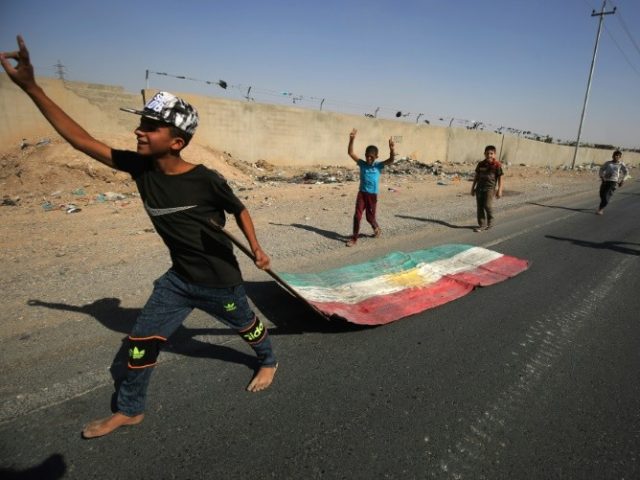Pentagon spokesman Army Col. Rob Manning told reporters on Monday that the U.S. military could potentially reconsider supporting the Iraqi military if attacks on Kurdistan Regional Government (KRG) territory continued, emphasizing that he would not “speculate” on any future actions at the moment.
Defense News reports that Manning also confirmed no American troops are involved in the current conflict in Kirkuk. Kurdish officials have stated that the troops fighting there, however—Iraqi soldiers and members of the Iran-backed Popular Mobilization Units (PMU) militias—are using American equipment they received to fight the Islamic State (ISIS) in their attack on the Kurdish Peshmerga.
“[I]f Iraqi forces do not cease the offensive, one possibility could be ceasing the equipment and training support the U.S. has provided,” Defense News interprets Manning as saying. Asked about the issue, Manning said, “I’m not going to speculate on that, but I’ll tell you we’re looking at all options.”
Manning denied any significant military skirmishes between the Peshmerga and the Iraqi military and PMU, however. “The coalition is monitoring movements of military vehicles and personnel in the vicinity of Kirkuk. These movements of military vehicles so far, have been coordinated movements not attacks,” he told reporters, echoing a statement from the U.S.-led Global Coalition against ISIS that described the attacks on the Peshmerga as a “misunderstanding.”
The U.S. State Department has also remained nonchalant in the face of the invasion of Kirkuk, expressing “concern” and “call[ing] on all parties to coordinate military activities and restore calm.”
President Donald Trump categorically refused “taking sides in that battle” between the Kurds and Iran allies in Baghdad, despite a strongly-worded speech condemning the Iranian regime on Friday. One of Iran’s highest-ranking soldiers, Major General Qasem Soleimani, is reportedly aiding Shiite militias against the Kurds.
Defense News notes that there are currently over 5,000 American soldiers operating in Iraq and Washington has spent over $26 billion on arms and equipment to Iraq since 2001. It adds that Iraqi forces lost much of their American equipment to the Islamic State upon fleeing battle in places like Kirkuk, which the Kurdish Peshmerga controlled between 2014, when the Iraqi army fled, and Monday. While Kirkuk is a multi-ethnic city and falls on the border between Kurdistan and Arab Iraq, the Peshmerga have controlled it since the mass Iraqi army desertion at the time.
Kurdish officials have called for the U.S. to intervene on their behalf, citing the use of American equipment meant to fight ISIS to attack the most formidable military on the ground against ISIS. Governor of Kirkuk province Najmaldin Karim confirmed to Breitbart News this weekend sightings of U.S.-provided tanks, artillery, Humvees, armored carriers, and weapons possessed by Shiite militias invading Kirkuk, as has the official Kurdistan Region Security Council.
“Peshmerga forces have destroyed at least five US Humvees used by PMF. Peshmerga will continue to defend Kurdistan, its peoples, and interests,” the Security Council said in a statement released Monday.
Prime Minister Haider al-Abadi ordered the invasion of Kirkuk, under KRG control, early Monday in response to the Kurds’ decision to hold a non-binding referendum on independence in September. Despite KRG President Masoud Barzani’s repeated calls to dialogue, Abadi has rejected any diplomacy and instead has begun an assault on disputed territories. The Peshmerga have largely avoided resorting to violence, instead ceding parts of Kirkuk, including major oil fields, to the Iraqi military. The Peshmerga also handed over northern Sinjar, site of the 2014 Islamic State Yazidi genocide, to a PMU militia, which Kurdish officials asserted was an all-Yazidi brigade.

COMMENTS
Please let us know if you're having issues with commenting.